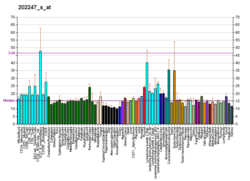Metastasis-associated protein MTA1 is a protein that in humans is encoded by the MTA1 gene. MTA1 is the founding member of the MTA family of genes.[5][6] MTA1 is primarily localized in the nucleus but also found to be distributed in the extra-nuclear compartments.[7] MTA1 is a component of several chromatin remodeling complexes including the nucleosome remodeling and deacetylation complex (NuRD).[8][9] MTA1 regulates gene expression by functioning as a coregulator to integrate DNA-interacting factors to gene activity.[10] MTA1 participates in physiological functions in the normal and cancer cells.[11][12] MTA1 is one of the most upregulated proteins in human cancer and associates with cancer progression, aggressive phenotypes, and poor prognosis of cancer patients.[9][13]
- ^ a b c GRCh38: Ensembl release 89: ENSG00000182979 – Ensembl, May 2017
- ^ a b c GRCm38: Ensembl release 89: ENSMUSG00000021144 – Ensembl, May 2017
- ^ "Human PubMed Reference:". National Center for Biotechnology Information, U.S. National Library of Medicine.
- ^ "Mouse PubMed Reference:". National Center for Biotechnology Information, U.S. National Library of Medicine.
- ^ Toh Y, Pencil SD, Nicolson GL (September 1994). "A novel candidate metastasis-associated gene, mta1, differentially expressed in highly metastatic mammary adenocarcinoma cell lines. cDNA cloning, expression, and protein analyses". The Journal of Biological Chemistry. 269 (37): 22958–22963. doi:10.1016/S0021-9258(17)31603-4. PMID 8083195.
- ^ Toh Y, Nicolson GL (December 2014). "Properties and clinical relevance of MTA1 protein in human cancer". Cancer and Metastasis Reviews. 33 (4): 891–900. doi:10.1007/s10555-014-9516-2. PMID 25359582. S2CID 17852701.
- ^ Liu J, Wang H, Huang C, Qian H (December 2014). "Subcellular localization of MTA proteins in normal and cancer cells". Cancer and Metastasis Reviews. 33 (4): 843–856. doi:10.1007/s10555-014-9511-7. PMID 25398252. S2CID 7959609.
- ^ Xue Y, Wong J, Moreno GT, Young MK, Côté J, Wang W (December 1998). "NURD, a novel complex with both ATP-dependent chromatin-remodeling and histone deacetylase activities". Molecular Cell. 2 (6): 851–861. doi:10.1016/s1097-2765(00)80299-3. PMID 9885572.
- ^ a b Li DQ, Kumar R (2015). "Unravelling the Complexity and Functions of MTA Coregulators in Human Cancer". Advances in Cancer Research. Vol. 127. pp. 1–47. doi:10.1016/bs.acr.2015.04.005. ISBN 9780128029206. PMID 26093897.
- ^ Kumar R, Gururaj AE (2008). "Coregulators as Oncogenes and Tumor Suppressors". In O'Malley BW, Kumar R (eds.). Nuclear Receptor Coregulators and Human Diseases. Hackensack, N.J.: World Scientific. pp. 195–218. doi:10.1142/9789812819178_0004. ISBN 978-981-281-917-8.
- ^ Sen N, Gui B, Kumar R (December 2014). "Physiological functions of MTA family of proteins". Cancer and Metastasis Reviews. 33 (4): 869–877. doi:10.1007/s10555-014-9514-4. PMC 4245464. PMID 25344801.
- ^ Sen N, Gui B, Kumar R (December 2014). "Role of MTA1 in cancer progression and metastasis". Cancer and Metastasis Reviews. 33 (4): 879–889. doi:10.1007/s10555-014-9515-3. PMC 4245458. PMID 25344802.
- ^ Kumar R (December 2014). "Functions and clinical relevance of MTA proteins in human cancer. Preface". Cancer and Metastasis Reviews. 33 (4): 835. doi:10.1007/s10555-014-9509-1. PMC 4245326. PMID 25348751.






